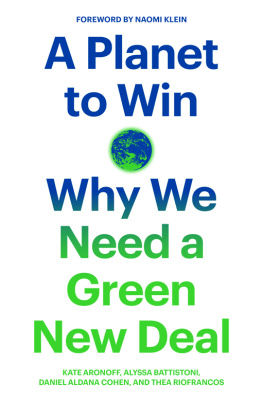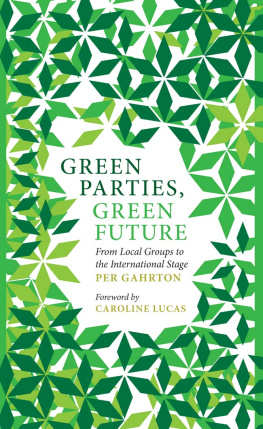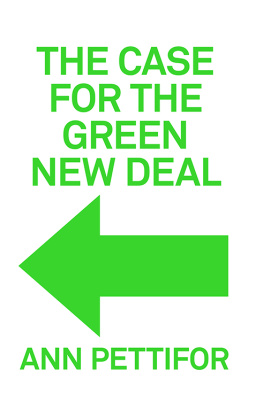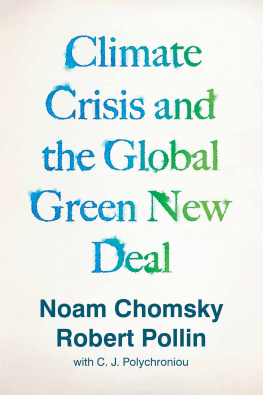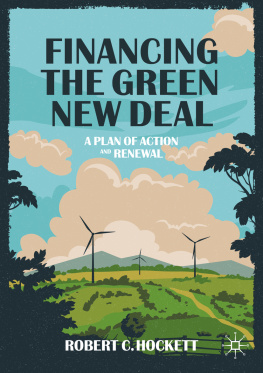Max Ajl - A People’s Green New Deal
Here you can read online Max Ajl - A People’s Green New Deal full text of the book (entire story) in english for free. Download pdf and epub, get meaning, cover and reviews about this ebook. publisher: Pluto Press, genre: Politics. Description of the work, (preface) as well as reviews are available. Best literature library LitArk.com created for fans of good reading and offers a wide selection of genres:
Romance novel
Science fiction
Adventure
Detective
Science
History
Home and family
Prose
Art
Politics
Computer
Non-fiction
Religion
Business
Children
Humor
Choose a favorite category and find really read worthwhile books. Enjoy immersion in the world of imagination, feel the emotions of the characters or learn something new for yourself, make an fascinating discovery.
A People’s Green New Deal: summary, description and annotation
We offer to read an annotation, description, summary or preface (depends on what the author of the book "A People’s Green New Deal" wrote himself). If you haven't found the necessary information about the book — write in the comments, we will try to find it.
A People’s Green New Deal — read online for free the complete book (whole text) full work
Below is the text of the book, divided by pages. System saving the place of the last page read, allows you to conveniently read the book "A People’s Green New Deal" online for free, without having to search again every time where you left off. Put a bookmark, and you can go to the page where you finished reading at any time.
Font size:
Interval:
Bookmark:

A Peoples Green New Deal
Hands-down the best book yet on the Green New Deal. Courageous, bold, refreshing Ajl envisions an ecosocialist transition that is rooted in principles of global justice.
Jason Hickel, author of Less is More
Ajl guides us with an authority steeped in scholarship but also with panache. If you really want to learn what'll be necessary for our species to survive climate apocalypse, read this book. You'll then know the ways by which humanity's very fate can be won.
Rob Wallace, author of Dead Epidemiologists: On the Origins of COVID-19
Anyone wanting to understand the limitations of the Green New Deal, and how it is being employed as a tool to rationalize Green Capitalism, and sanitize its advance within the capitalist system must read this critical work.
Kali Akuno, Executive Director of Cooperation Jackson
You cannot purchase your way out of climate change the same way you cannot pick a Green New Deal brand that suits your personal preferences, Ajl argues. Neither are real alternatives. Anti-imperialism and anti-capitalism are not bygone projects. Theyre very much alive in the South and at the center of climate movements. Left climate movements in the North would be better served by following their example as well as reading this critical work.
Nick Estes, author of Our History Is the Future: Standing Rock Versus the Dakota Access Pipeline, and the Long Tradition of Indigenous Resistance
Max Ajl

First published 2021 by Pluto Press
345 Archway Road, London N6 5AA
www.plutobooks.com
Copyright Max Ajl 2021
The right of Max Ajl to be identified as the author of this work has been asserted in accordance with the Copyright, Designs and Patents Act 1988.
British Library Cataloguing in Publication Data
A catalogue record for this book is available from the British Library
ISBN 978 0 7453 4174 3 Hardback
ISBN 978 0 7453 4175 0 Paperback
ISBN 978 1 78680 705 2 PDF
ISBN 978 1 78680 706 9 EPUB
ISBN 978 1 78680 707 6 Kindle
This book is printed on paper suitable for recycling and made from fully managed and sustained forest sources. Logging, pulping and manufacturing processes are expected to conform to the environmental standards of the country of origin.
Typeset by Stanford DTP Services, Northampton, England
Simultaneously printed in the United Kingdom and United States of America
Thanks to my editor, David Shulman, for supporting this project from the outset. Thanks to many comrades, some of who did not know me very well, for offering very quick feedback on my draft manuscript or suggestions for sources: James Trafford, Nemanja Luki, Stefania Barca, Bue Rbner Hansen, Cora Roelofs, Matt Haugen, Alex Heffron, Willliam Thomson, Brant Roberts, Eric Holt-Gimnez, Sam Markwell, Zeyad El Nabolsy, Fadil Aliriza, Mabrouka MBarek, and Justin Podur. Thanks to Anitha Stephen for preparing the index. Thanks also to Rob Wallace, Maywa Montenegro de Wit, Mili Narayen, Aaron Vastinjan, Ruth Nyambura, Rut Elliot Blomqvist, and John Gulick for ongoing discussion on eco-socialism.
Jeff Bezos, the worlds richest man, spoke of the Green New Deal with the alpine clarity one would expect from someone steering a company, which if it were a country, would rank around 70th in total CO2 emissions: There are a lot of different ideas for what the Green New Deal is, he said, and its probably too broad to say too much about that in particular. Bezos, like all corporate magnates, operates in a world of balance sheets and the pressure to maximize quarterly earnings. He is well aware that Amazon is part of a dizzyingly complex world. Despite perpetual hype and digital chatter about the post-industrial economy or other hallucinations of a humanity or a capitalism severed from the world of things, reality remains concrete. In a way, that is an understatement. The footprint of capitalism on the worlds resources is heavier and heavier, now vastly exceeding the planets capacity to regenerate itself. This includes the physical impact, in mines and massive energy use, of the not-at-all-ethereal tech-world itself.
Amazon is part of a high-consumption economy based on planned obsolescence. It depends on ensuring people buy what Amazon sells: a deliberately forged culture of consumption, personal loans and personal debt, and manufactures which cannot be repaired except at enormous cost. Consumer electronics and worldwide delivery systems need a huge network of gas stations and publicly subsidized roads. Nearly instant delivery requires a devastated workforce in the core, which will deliver even when the Post Office does not. Furthermore, Amazon relies on a certain way of organizing the human relationship with the environment. Each item for sale on Amazons website, its energy-guzzling cloud data servers, its gossamer logistical systems which enable same-day delivery, is tied with a million threads to use of carbon sinks and the atmospheric space for CO2 emissions. These occur without the permission of humanity. Furthermore, lives have been lessened in length and quality by the freedom to pollute, especially in the South. Additionally, Amazon needs cheap access to the raw materials which are the inputs for the thousands of knickknacks and gewgaws which, as they flow from factory to family, rip apart the world in which we live, and mound great profit in the pockets of the planets Bezoses. It relies on poor people in the planets Third World remaining poor, and often landless, displaced to slums, forced to work in factories that produce what Amazon sells.
A Green New Deal (GND) which imagines replacing delivery vehicles which run on oil with those that run on lithium batteries, which imagines a continued closed-loop consumer economy based on recycling every bit of metal and plastic and replacing natural gas with state-subsidized nuclear power, could work for Amazons business model and the capitalism in which it fits. It would be no problem at all for Bezos at least in the short term.
But a Peoples Green New Deal based on universal access to renewable energy, climate debt payments, de-commodified public spaces, funding for the arts, 24-hour public libraries, and food sovereignty in the South and the North alike would wreak havoc on Amazons supply chain. It would empower the laborers who fill its lower rungs. It would chip away at the coerced and individualized and debt-fueled consumption on which it rests. And it would sever huge portions of peoples needs from capitalist accumulation circuits. Moving to agroecology, or the application of ecological principles and concepts for the design and management of sustainable agro-ecosystems, would further break apart the Amazon-friendly structuring of the world. If the Peoples Green New Deal enfolded demands for political sovereignty in the South, such a plan for planetary just transition would burst apart a capitalist system which rests on super-exploitation of the Third World, using it as a garbage dump and labor supplier. A Peoples GND would become eco-socialist: the worldwide decommodification of social life and the conscious and conscientious management by the associated producers, or revolutionary humanity, of our relationship with non-human nature so as to ensure its longevity and well-being.
As Bezos says: its probably unhelpful to say too much about the GND in general. Angels and devils dwell in the details. Which GND and why does it matter? What is at stake in one or the next, who has a stake in one or the next, and for whom does it not matter at all? This book is primarily about the GND debate in the United States. But the US resembles an island only in the most literal sense, and the same debates are happening across the imperial states. More importantly, everything the US political elite does or does not do occurs and impacts a sharply uneven world from Pentagon budgets and the petrodollar which translate into a fire from the sky on Yemeni smallholders, to the decision to demilitarize, to speeds-ofemissions reductions which submerge or stabilize the Seychelles. And from cobalt-laden tech for batteries for fleets of electric cars which rely on the continuing underdevelopment and war-fueled annihilation of the Congo to keep their prices cheap, to the decision to quickly move the population of the US to free electrified public transport, bicycles, and local work.
Font size:
Interval:
Bookmark:
Similar books «A People’s Green New Deal»
Look at similar books to A People’s Green New Deal. We have selected literature similar in name and meaning in the hope of providing readers with more options to find new, interesting, not yet read works.
Discussion, reviews of the book A People’s Green New Deal and just readers' own opinions. Leave your comments, write what you think about the work, its meaning or the main characters. Specify what exactly you liked and what you didn't like, and why you think so.



